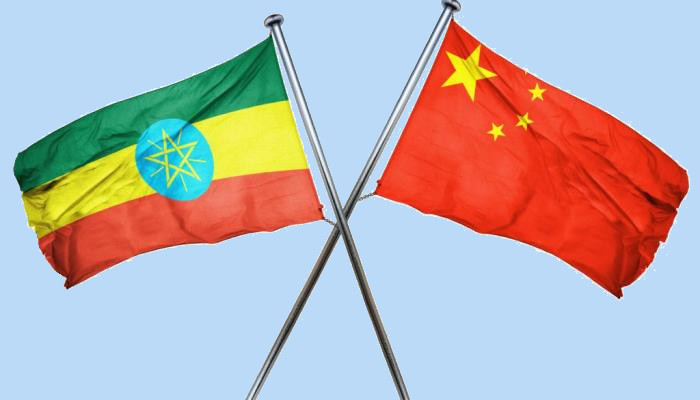2023 ushers in historic advancements in Ethiopia-China ties: Scholars
Addis Ababa, January 1, 2024 (FBC) – As a vivid manifestation of the ever-deepening Ethiopia-China ties, 2023 marks historic advancements in the partnership between the two countries, which elevated their ties to an all-weather strategic partnership.
The two countries, over the course of 2023, achieved fruitful results in their cooperation, raning from cooperation in diplomatic and high-level exchanges, capacity development and knowledge transfer to flourishing socioeconomic and people-to-people ties.
In October of this year, Ethiopia and China announced the elevation of their ties to an all-weather strategic partnership during Ethiopian Prime Minister Abiy Ahmed’s visit to Beijing.
Amid the deepening Sino-Ethiopia ties, experts highlighted the multifaceted and win-win socioeconomic outcomes resulting from the comprehensive ties between the two countries.
Melaku Mulualem, a senior researcher in international relations and diplomacy at Ethiopia’s Institute of Strategic Affairs, said the year 2023 “will be remembered as a historic chapter” in Sino-Ethiopia relations.
“The concluding year marks numerous milestones in the ties between the two countries – be it in the diplomatic arena, socioeconomic sectors, or in terms of cultural exchanges and people-to-people relationships,” Mulualem said.
The expert further underscored the two countries’ commitments to cooperate in realizing the China-proposed Belt and Road Initiative, the Global Security Initiative, as well as the Global Development Initiative.
Constantinos Berhutesfa Constantinos, a professor of public policy at Addis Ababa University in Ethiopia, noted China’s “practical engagements” in Ethiopia, emphasizing China’s efforts toward realizing its commitments.
“The year 2023 has shown us that China stood true to its promises by transforming its commitments into reality in helping Ethiopia’s development efforts,” Constantinos told Xinhua.
In addition to diplomatic triumphs, the year 2023 also witnessed further deepening of Sino-Ethiopia ties in the multilateral arena, as evidenced by Ethiopia’s membership in the BRICS mechanism.
During the 15th BRICS Summit held in August in Johannesburg, South Africa, BRICS leaders agreed to invite six countries – Argentina, Egypt, Ethiopia, Iran, Saudi Arabia and the United Arab Emirates – to join the group. The membership of these six countries is set to take effect on Jan. 1, 2024.
Experts argued that the East African country’s entry into the BRICS mechanism is expected to facilitate economic growth and help forge strong and lasting cooperation within the BRICS family.
Balew Demissie, an associate professor at Addis Ababa University, told Xinhua that working with China and other members of BRICS will advance Ethiopia’s economic development by attracting foreign direct investment for industrialization and infrastructure projects.
Mukerrim Miftah, an assistant professor at the Ethiopian Civil Service University, said that Ethiopia’s admission to BRICS “will help Ethiopia forge strong, lasting economic and political cooperation with the BRICS family,” enabling the country to pursue political relations in an institutionalized and mutually beneficial manner.
According to Prime Minister Abiy Ahmed, the country’s membership in the BRICS mechanism is advantageous as the group promotes the South-South cooperation framework.
“Since Ethiopia is an important country within the South-South cooperation framework, we believe that our membership in BRICS would be an important impetus for both Ethiopia and other BRICS members,” Ahmed told members of the Ethiopian parliament recently.
China’s multifaceted capacity development and knowledge transfer assistance to Ethiopia are among the many positive outcomes of Sino-Ethiopia cooperation in 2023. These efforts are anchored by different initiatives such as the Luban Workshop, the Confucius Institute, and collaboration in technical and vocational education and training (TVET), among others.
Earlier this month, the Confucius Institute at Addis Ababa University (AAU) received acclaim for its 10 years of operation, fortifying the deepening ties between China and Ethiopia. During the past decade, the institute has seen over 10,000 students enroll in Chinese language studies across the East African country.
“Over the past 10 years, the Confucius Institute at AAU has made positive contributions to promote the friendship between Ethiopia and China through language education and cultural exchange,” said Ethiopia’s State Minister of Education Kora Tushune.
During the past years, China and Ethiopia have achieved fruitful outcomes in Belt and Road cooperation, including the construction of the Addis Ababa-Djibouti Standard Gauge Railway and the launch of Ethiopia’s first-ever satellite, abbreviated as ETRSS-1, into space from China.
“The capacity development and knowledge transfer initiatives, particularly in remote sensing applications and satellite in-orbit operations, have equipped us with the necessary skills to confidently carry out satellite operations,” said Dawit Kassaw, a unit leader for the ground application satellite system at the Ethiopian Space Science and Geospatial Institute.
“The training and skills transfer efforts have provided us with the foundational knowledge and skills,” Kassaw added.
Haftom Gebregziabher, deputy director-general of the Ethiopian Technical University, said that cooperation with China is empowering Ethiopia with a skilled workforce required to fill the gap in the modern industrial landscape.
He said the successful transfer of knowledge and skills from China in the fields of science and technology is helping Ethiopia realize its development aspirations. Gebregziabher highlighted the Luban Workshop, a Chinese vocational training program, as a manifestation of the ever-expanding Ethiopia-China cooperation in the field of science and technology.
Abraham Asrat, chief executive officer of strategic affairs at the Ministry of Labor and Skills, said the year 2023 witnessed growing exchanges and experience-sharing endeavors among Chinese TVET institutions and Ethiopian counterparts, eventually uplifting cooperation on human capacity development.
Source: Xinhua


